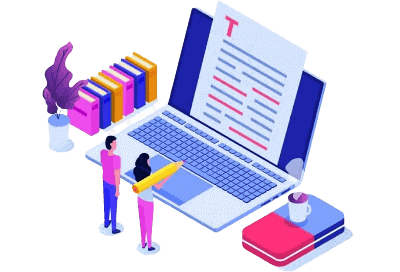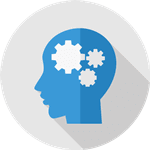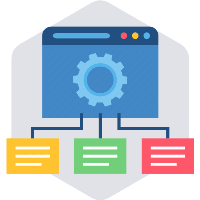 The nuptials of human intellect and artificial intelligence have ushered in a new era of research and scholarship. As technology advances astonishingly, the academic landscape is witnessing the emergence of AI-created dissertations, where machine-driven algorithms craft intricate research papers, pushing the boundaries of achievable. However, while AI holds immense promise, it is not without its imperfections. That’s why we are here, to offer a critical bridge between artificial intelligence capabilities and the nuanced touch of human AI content editing expertise. The advent of AI-written projects has undoubtedly accelerated the research process, offering scholars invaluable tools to streamline their work. Yet, these papers can sometimes lack the finesse, coherence, and context that only a human editor can provide. This is where Petrian Editing Service intervenes, a dedicated team of experienced editors poised to refine and elevate AI dissertations. In this age of innovation, we recognize that harnessing the full potential of AI also necessitates a human touch. We believe that while AI can expedite research and data analysis, human intuition, creativity, and understanding bring true depth and clarity to academic writing. Our editing service can assist in enhancing dissertations, ensuring that they meet the highest standards of academic excellence. We offer expert human editing help for AI-made dissertations.
The nuptials of human intellect and artificial intelligence have ushered in a new era of research and scholarship. As technology advances astonishingly, the academic landscape is witnessing the emergence of AI-created dissertations, where machine-driven algorithms craft intricate research papers, pushing the boundaries of achievable. However, while AI holds immense promise, it is not without its imperfections. That’s why we are here, to offer a critical bridge between artificial intelligence capabilities and the nuanced touch of human AI content editing expertise. The advent of AI-written projects has undoubtedly accelerated the research process, offering scholars invaluable tools to streamline their work. Yet, these papers can sometimes lack the finesse, coherence, and context that only a human editor can provide. This is where Petrian Editing Service intervenes, a dedicated team of experienced editors poised to refine and elevate AI dissertations. In this age of innovation, we recognize that harnessing the full potential of AI also necessitates a human touch. We believe that while AI can expedite research and data analysis, human intuition, creativity, and understanding bring true depth and clarity to academic writing. Our editing service can assist in enhancing dissertations, ensuring that they meet the highest standards of academic excellence. We offer expert human editing help for AI-made dissertations.
The intersection of AI and human editing in dissertation writing
The connection of AI and human editing represents a dynamic synergy that leverages the strengths of both technology and human expertise. AI, with its natural language processing capabilities, can play a crucial role in the initial stages of drafting and editing. It can assist in grammar and spell-checking, suggest style improvements, and even help organize content for coherence and clarity. However, AI has limitations. It may not fully grasp the nuances of subject matter or context, and it can't replace the critical thinking and creativity inherent to human editing. This is where our human editors come in. Their deep understanding of the subject matter, academic conventions, and the individuality of the writer's voice allows them to provide invaluable insights, refine arguments, and ensure the dissertation meets the highest standards of academic rigor. The collaboration between AI and our human editors optimizes the writing process. AI tools enhance efficiency and catch common errors, freeing human editors to focus on higher-level tasks. Together, we produce dissertations that are not only error-free but also intellectually rigorous and engaging. This intersection represents a harmonious fusion of technology and human intelligence, resulting in the production of high-quality, polished dissertations.
The crucial role of our human editors in AI-generated dissertations
Our human editors play a crucial role in AI-created dissertations. We offer the best human editing service for an AI-written dissertation, to ensure the quality and integrity of the content. While AI can generate text based on patterns and data, it may not always produce coherent, accurate, or contextually appropriate content. We bridge this gap by reviewing and refining the AI-generated material, correcting errors, improving clarity, and ensuring that the dissertation meets academic standards. Moreover, our human editors add a valuable layer of expertise. Dissertations often require specialized knowledge and a deep understanding of the subject matter. Our experts with subject-specific expertise can enhance the content by providing context, relevant citations, and critical insights that AI may lack. Another essential role of our editors is maintaining ethical standards. They can identify and address issues related to plagiarism, ethical research practices, and sensitive topics. This ensures that the AI-generated dissertation aligns with academic and ethical guidelines. More so, our human editors contribute to the personal touch of a dissertation. They can adapt the style, tone, and voice to match the author's preferences, making the document feel more authentic and reflective of the author's unique perspective. We serve as guardians of quality, subject matter experts, ethical gatekeepers, and custodians of personal expression in AI-generated dissertations, playing an indispensable role in producing high-quality academic work.
How our reviewing services perfect AI-based dissertations
We play a crucial role in perfecting AI-projects by providing the expertise, critical thinking, and nuanced understanding that AI may lack. We ensure;
- Language Polishing: We excel at fine-tuning language, fixing grammatical errors, improving sentence structure, and ensuring clarity, which can be challenging for AI due to the complexity of academic writing.
- Contextual Understanding: Our human editors possess a deep understanding of the subject matter and can ensure that the AI-generated content aligns with the dissertation's research objectives and scholarly conventions.
- Quality Assurance: We can identify inconsistencies, logical gaps, or inaccuracies in the content, ensuring that the dissertation maintains a high level of quality and coherence.
- Formatting and Style: Our experts can meticulously format the dissertation according to the required style guide (e.g., APA, MLA) and ensure consistency in citations, references, and overall presentation.
- Voice and Tone: Our human editors can adapt the AI-generated content to match the intended academic voice and tone, making it sound more natural and authoritative.
- Customization: We can tailor the content to meet the specific requirements and preferences of the author, aligning the dissertation more closely with their vision.
 The process of refining AI-written works represents a promising and dynamic fusion of technology and human expertise. While AI has undoubtedly revolutionized content generation, particularly in academic writing, it still falls short in capturing the nuances, creativity, and context-specific requirements that are integral to a high-quality dissertation. Our human editors bring a critical human touch to this technological advancement. They possess the ability to discern subtle errors, enhance coherence, and ensure that the AI-generated content aligns perfectly with the specific requirements of a dissertation. Their expertise extends beyond mere grammar and syntax; they provide valuable insights, conduct fact-checking, and guarantee that the work adheres to the highest academic standards. Moreover, the collaboration between us and AI offers a balanced solution, optimizing efficiency and maintaining academic integrity. This hybrid approach enables scholars to harness the efficiency of AI while preserving the authenticity and uniqueness of their research. As we move forward in the era of AI-driven content creation, we will continue to play a fundamental role in elevating the quality of academic work. We serve as the bridge between technology and human intellect, ensuring that AI-created dissertations are not just well-structured and error-free but also rich in academic rigor, depth, and credibility. This synergy between AI and human editing represents a powerful stride towards advancing academic research and knowledge dissemination.
The process of refining AI-written works represents a promising and dynamic fusion of technology and human expertise. While AI has undoubtedly revolutionized content generation, particularly in academic writing, it still falls short in capturing the nuances, creativity, and context-specific requirements that are integral to a high-quality dissertation. Our human editors bring a critical human touch to this technological advancement. They possess the ability to discern subtle errors, enhance coherence, and ensure that the AI-generated content aligns perfectly with the specific requirements of a dissertation. Their expertise extends beyond mere grammar and syntax; they provide valuable insights, conduct fact-checking, and guarantee that the work adheres to the highest academic standards. Moreover, the collaboration between us and AI offers a balanced solution, optimizing efficiency and maintaining academic integrity. This hybrid approach enables scholars to harness the efficiency of AI while preserving the authenticity and uniqueness of their research. As we move forward in the era of AI-driven content creation, we will continue to play a fundamental role in elevating the quality of academic work. We serve as the bridge between technology and human intellect, ensuring that AI-created dissertations are not just well-structured and error-free but also rich in academic rigor, depth, and credibility. This synergy between AI and human editing represents a powerful stride towards advancing academic research and knowledge dissemination.
AI-Generated Dissertation Quality Improvement by Human Editors
 In academics, the pursuit of knowledge is a never-ending journey. At its pinnacle, the culmination of years of research and dedication often takes the form of a dissertation. This scholarly opus not only represents the expertise and intellectual prowess of a student but also serves as a critical milestone in their educational journey. As we stand on the precipice of the 21st century, a remarkable synergy between artificial intelligence (AI) and human expertise is poised to revolutionize the quality and precision of these academic dissertations. This paradigm shift is encapsulated in the concept of AI content improvement through human editing. In an era where AI algorithms have demonstrated their prowess across various domains, from language translation to image recognition, harnessing their potential to enhance the quality of academic dissertations is a natural progression. However, the transformative power of AI is not an autonomous one. It thrives when complemented by the nuanced insights, context, and creativity of human editors. This dynamic union of AI-made content and our human editing proficiency promises to bring forth a new era in academia where dissertations are not only well-researched and structured but also refined to the highest standards of clarity, coherence, and scholarly excellence. We will help you understand how this blend of technology and our human expertise can reliably elevate the quality of academic dissertations, ensuring that the voices of aspiring scholars resonate with precision and impact. We can offer reliable AI-produced dissertation editing help to make the much-required upgrade.
In academics, the pursuit of knowledge is a never-ending journey. At its pinnacle, the culmination of years of research and dedication often takes the form of a dissertation. This scholarly opus not only represents the expertise and intellectual prowess of a student but also serves as a critical milestone in their educational journey. As we stand on the precipice of the 21st century, a remarkable synergy between artificial intelligence (AI) and human expertise is poised to revolutionize the quality and precision of these academic dissertations. This paradigm shift is encapsulated in the concept of AI content improvement through human editing. In an era where AI algorithms have demonstrated their prowess across various domains, from language translation to image recognition, harnessing their potential to enhance the quality of academic dissertations is a natural progression. However, the transformative power of AI is not an autonomous one. It thrives when complemented by the nuanced insights, context, and creativity of human editors. This dynamic union of AI-made content and our human editing proficiency promises to bring forth a new era in academia where dissertations are not only well-researched and structured but also refined to the highest standards of clarity, coherence, and scholarly excellence. We will help you understand how this blend of technology and our human expertise can reliably elevate the quality of academic dissertations, ensuring that the voices of aspiring scholars resonate with precision and impact. We can offer reliable AI-produced dissertation editing help to make the much-required upgrade.
What does the rise of AI-enhanced dissertations mean in academia?
The rise of AI-enhanced projects in academia signifies a transformative shift in research and scholarship. AI technologies offer several significant implications:
- Efficiency: AI can streamline data analysis, literature reviews, and content generation, expediting the research process. This enables scholars to focus more on critical thinking and hypothesis testing.
- Data Handling: It can handle vast datasets and identify patterns that may elude human researchers. This enhances the quality of empirical research and provides deeper insights.
- Interdisciplinary Collaboration: It facilitates interdisciplinary research by bridging gaps between fields. Researchers can harness AI to analyze data from diverse sources, fostering cross-disciplinary innovation.
- Accessibility: It can aid in making complex research more accessible to a broader audience by simplifying explanations and visualizing data effectively.
- Future-Proofing: Students using it in their dissertations develop skills that are increasingly relevant in a technology-driven job market.
How we combine AI and our human editors’ expertise to ensure dissertation excellence
Combining AI and our human editors' expertise involves a collaborative approach that leverages the strengths of both. AI tools can be used to enhance the efficiency and consistency of the editing process, while our human editors bring their nuanced understanding and critical thinking skills to the table. We guarantee AI-generated dissertation quality improvement by human editors, as we have the best team in this field. AI can assist by automating tasks such as grammar and spell-checking, formatting, and even identifying potential areas for improvement in terms of clarity and coherence. Machine learning algorithms can also provide insights into common writing pitfalls and suggest revisions. However, our human touch is irreplaceable. Our editors with subject matter expertise can delve deep into the content, ensuring that arguments are sound, research is rigorous, and ideas are well-articulated. They can also consider the unique context and requirements of each dissertation, tailoring their feedback accordingly. The synergy between AI and our editors is a powerful one, where AI streamlines the mechanical aspects of editing, leaving us more time to focus on the intellectual and creative aspects of refining a dissertation. This collaborative approach ultimately leads to a higher quality final product, combining the efficiency of AI with the wisdom and judgment of our human experts.
How is our editing help on AI-created projects a game-changer for grad students?
Our editing assistance on AI-created projects is a transformative game-changer for graduate students in several fundamental ways. We help students navigate the complexities of AI content. While AI can expedite research and content creation, it often lacks the nuanced understanding and finesse required for academic work. Our human editors bridge this gap, ensuring that the final output is not just comprehensive but also meets the rigorous standards of scholarly communication. More so, we empower grad students to leverage AI as a valuable tool rather than a replacement. By collaborating with our editors, students can harness the efficiency of AI while maintaining control over their research and scholarly voice. This enables them to focus on the creative and critical aspects of their work, confident that the final result will be polished and publication-ready. Furthermore, our editing assistance augments the learning process. Grad students can learn from the improvements and suggestions made by our editors, enhancing their own writing and research skills over time. This educational dimension extends the benefits beyond a single project. Relevantly, our editing support in the context of AI-generated projects empowers graduate students to navigate the cutting edge of technology while upholding the timeless standards of academic excellence. It's a game-changer that ensures their work not only keeps pace with innovation but also stands out for its quality and rigor in the competitive world of academia.
 The integration of AI content with human editorial expertise represents a promising avenue for enhancing the overall quality of dissertations. Throughout this discussion, we have explored the multifaceted advantages of such a collaborative approach. AI-powered tools have shown their mettle in automating and streamlining various aspects of the research and writing process. They can aid in data analysis, literature reviews, and even generate initial drafts, saving researchers valuable time and effort. However, they are not without their limitations, particularly in understanding the nuances of research topics, context, and the finer points of scholarly communication. We, on the other hand, bring a deep understanding of subject matter, writing conventions, and the ability to refine and polish content to a high standard. Our expertise adds a crucial layer of quality control that ensures the final dissertation is coherent, well-structured and adheres to academic standards. If you combine the strengths of AI and our human editors, we can harness the efficiency and automation of AI while preserving the essential qualities of human judgment and creativity. This partnership can significantly elevate the quality of dissertations, making them more rigorous, insightful, and impactful. This integration represents a symbiotic relationship that holds great promise for the future of academic research. This hybrid approach can empower researchers to produce dissertations of higher quality and impact, ultimately advancing the frontiers of knowledge across various fields. As technology continues to evolve, the synergy between AI and human expertise will likely play an increasingly vital role in academics.
The integration of AI content with human editorial expertise represents a promising avenue for enhancing the overall quality of dissertations. Throughout this discussion, we have explored the multifaceted advantages of such a collaborative approach. AI-powered tools have shown their mettle in automating and streamlining various aspects of the research and writing process. They can aid in data analysis, literature reviews, and even generate initial drafts, saving researchers valuable time and effort. However, they are not without their limitations, particularly in understanding the nuances of research topics, context, and the finer points of scholarly communication. We, on the other hand, bring a deep understanding of subject matter, writing conventions, and the ability to refine and polish content to a high standard. Our expertise adds a crucial layer of quality control that ensures the final dissertation is coherent, well-structured and adheres to academic standards. If you combine the strengths of AI and our human editors, we can harness the efficiency and automation of AI while preserving the essential qualities of human judgment and creativity. This partnership can significantly elevate the quality of dissertations, making them more rigorous, insightful, and impactful. This integration represents a symbiotic relationship that holds great promise for the future of academic research. This hybrid approach can empower researchers to produce dissertations of higher quality and impact, ultimately advancing the frontiers of knowledge across various fields. As technology continues to evolve, the synergy between AI and human expertise will likely play an increasingly vital role in academics.






